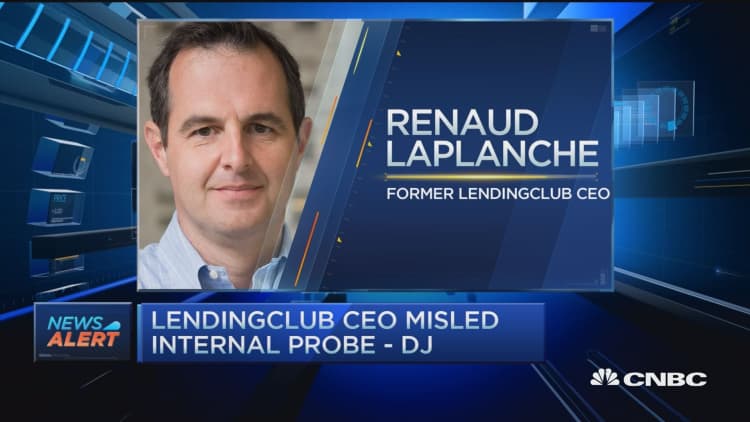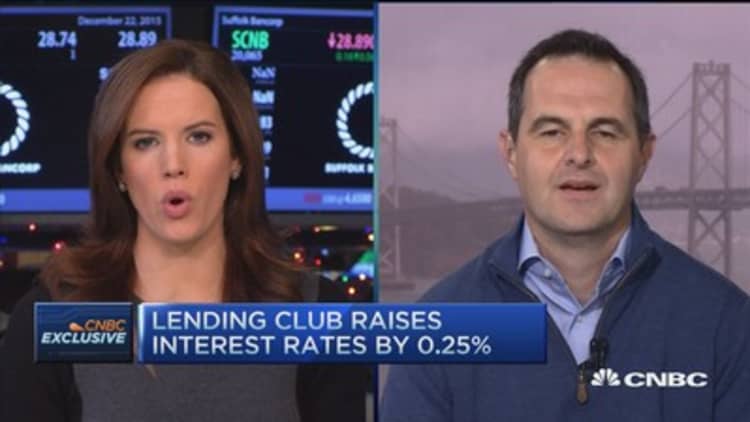
LendingClub founder Renaud Laplanche isn't just the face of a company, but an industry.
He created the first billion-dollar U.S. online lending marketplace, built a board replete with finance heavy hitters Larry Summers, John Mack and Mary Meeker, and kicked off the LendIt conference in April for the fourth-straight year.
Laplanche and his company are so synonymous that the French entrepreneur and competitive sailor raced to a trans-Pacific record last year in a 105-foot trimaran named the Lending Club 2 (its predecessor, the Lending Club, was 73-feet long).
Thus, the online lending industry that Laplanche helped pioneer was shocked on Monday morning by a press release from LendingClub announcing that its board had accepted his resignation due to a "violation of the company's business practices along with a lack of full disclosure during the review."
"This was more than a company to him — this was his mission," said Peter Renton, the founder of LendIt and industry publication Lend Academy. Renton called Laplanche the "godfather" of the industry.
The news couldn't have come at a worse time.
Skepticism toward this emerging form of banking has been building in recent months as concern about a slowing economy raised doubts about whether technology-based underwriting will hold up should unemployment rise and credit deteriorate.
Consumer lender Avant reportedly saw a 27 percent decline in loan volume in the fourth quarter from the previous period, according to an April 20 Wall Street Journal story, citing data from Kroll Bond Rating Agency.
LendingClub's shares plunged 35 percent on Monday to $4.62, the lowest since the company's IPO in December 2014. Even before the one-day route, the stock was 53 percent below its debut price and down 36 percent in 2016.
Last week was a disaster for other high-profile online lenders. On Deck Capital, which funds small businesses, tumbled 34 percent on May 3, after missing analysts' quarterly revenue estimates and is more than 80 percent off its December 2014 IPO price. Prosper Marketplace, LendingClub's privately held smaller rival, said last week that it cut 170 jobs, shut its Salt Lake City office and reported a 12 percent drop in first-quarter loan volume.
"This is the worst seven days in the history of the industry," Renton said.

Laplanche's resignation is the most alarming news because it speaks to the trust and reliability of a burgeoning market. LendingClub found in a review that $22 million in near-prime loans were purchased by a single institutional investor in March and April, and the assets "failed to conform to the investor's express instructions."
Laplanche and other employees were aware that the loans did not meet the investor's requests, the company said. Three other senior managers were also fired.
The board began a probe after finding a discrepancy in the application date of one of the loans, and the company then hired an outside firm to investigate all loans issued in the first quarter.
During the review, it was discovered that Laplanche separately failed to disclose an investment in a third-party fund while the company "was contemplating an investment in the same fund."
Sources familiar with the matter told CNBC that Laplanche's lack of transparency and failure to cooperate in the investigation led to a loss of trust and his forced resignation. Laplanche didn't respond to an e-mailed request for comment.
Among industry experts, the general view is that this was bad behavior but not particularly scandalous. However, given the sensitivity around any sort of financial transaction and the need for strong internal controls, LendingClub's board acted swiftly, as much to prove a point as to hold the CEO accountable, analysts said.
Charles Moldow, a partner at venture firm Foundation Capital and an early investor in LendingClub and On Deck, said there's a glass-half-full interpretation of the LendingClub news. Moldow is a long-time bull on marketplace lending, estimating in a 2014 white paper that the market would reach $1 trillion in issued loans by 2025.
He's betting that a new class of lenders, providing a better consumer experience than banks with far lower fees and attractive returns for investors, will capture greater share in consumer, small business and student finance.
LendingClub is proof that they're acting with prudence.
"At some level, the investor community before this wouldn't have known whether these fintech start-ups are running fast and loose or whether they're serious companies making sure they're being transparent and following regulatory procedures," said Moldow, who hosts an annual pre-LendIt dinner with some of the industry leaders. "LendingClub is demonstrating a serious commitment towards transparency."
Foundation still owns 7.1 percent of LendingClub's shares, according to FactSet, though the firm doesn't have a board seat.
Read MoreCitigroup invests in online lender BlueVine
LendingClub is paying a heavy price in losing its founder and chief evangelist.
Laplanche created LendingClub in 2006 and launched it the following year as a way for retail investors to put money into prime consumer loans. The idea, as Laplanche has described many times, stemmed from an experience he had before going on a European vacation with his wife, following the sale of his previous software company to Oracle.
In getting his finances together, Laplanche noticed that his bank deposits were earning virtually no interest while his credit card fee from the same bank was in the teens. Banks use that fat margin to pay for all sorts of inefficiencies, like tons of branch offices and mass marketing campaigns. And because they can.
Laplanche's idea was to bring down rates through better underwriting and turn over the profit to outside investors who are always hungry for returns.
But before the company could take off, it was faced with a near-death crisis. The SEC was bearing down on LendingClub and Prosper for what looked like the sale of unregistered securities. Laplanche shut down the business in early 2008 and relaunched later that year with a new system that automatically filed every loan as a security with the SEC.
By 2013, Laplanche was like an indie rock star, keynoting the inaugural LendIt conference in New York in front of about 300 people. Laplanche has since gone mainstream, as has the event, which attracts closer to 4,000 attendees.
Growth has been staggering, and it's no longer just in consumer loans. LendingClub is also lending to small businesses and medical offices.
"We're branching out and becoming more relevant and more meaningful in our customers' lives," Laplanche said at LendIt. We're "continuing to establish ourselves as the trusted financing partner for our customers and really address all of their credit needs."
The company crossed $1 billion in originations in 2012, $7 billion in 2014 and last quarter neared $18 billion. In fact, even as the company reckoned with the departure of its founder and a more sanguine debt market, it reported a 68 percent increase in originations in the first quarter to $2.75 billion and an 87 percent surge in operating revenue to $151.3 million. All that while swinging to a net profit.
Credit Karma, a comparison service for online financial products, told CNBC earlier this year that personal loans funded on its website climbed 148 percent in 2015, following growth of 374 percent in 2014. LendingClub is far from the only player in town.
"Renaud might be leaving an industry he helped create, but he's not taking the fundamentals with him," said David Klein, CEO of CommonBond, an online student lender founded in 2011. "The platforms in finance, marketplace lending or otherwise, that serve the customer better than others, offer investors solid risk-adjusted returns, and demonstrate strong unit economics will win over time."
There's little doubt that Laplanche's abrupt departure is a watershed moment. Regulators weary of new business models and perceived risky products are ready to pounce. Lawyers are already preparing lawsuits on behalf of shareholders. Traditional bankers annoyed by what they see as Silicon Valley hubris can finally say the new kids had it coming.
In April, LendingClub, Prosper and business lender Funding Circle teamed up to form the Marketplace Lending Association to "promote responsible business practices and sound public policy to benefit borrowers and investors."
They've now got some extra work to do, and the industry needs to find a new flag bearer.
This story was corrected to change Avant Credit to Avant.
— Josh Lipton and Jon Marino contributed to this report






